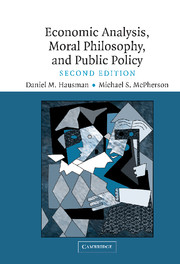Book contents
- Frontmatter
- Contents
- Preface
- INTRODUCTION
- I RATIONALITY AND MORALITY
- II WELFARE AND CONSEQUENCES
- III LIBERTY, RIGHTS, EQUALITY, AND JUSTICE
- IV MORAL MATHEMATICS
- CONCLUSIONS
- 15 Pollution Transfers and School Vouchers: Normative Economics Reconsidered
- 16 Economics and Ethics, Hand in Hand
- Appendix: How Could Ethics Matter to Economics?
- Glossary
- References
- Index
16 - Economics and Ethics, Hand in Hand
Published online by Cambridge University Press: 06 July 2010
- Frontmatter
- Contents
- Preface
- INTRODUCTION
- I RATIONALITY AND MORALITY
- II WELFARE AND CONSEQUENCES
- III LIBERTY, RIGHTS, EQUALITY, AND JUSTICE
- IV MORAL MATHEMATICS
- CONCLUSIONS
- 15 Pollution Transfers and School Vouchers: Normative Economics Reconsidered
- 16 Economics and Ethics, Hand in Hand
- Appendix: How Could Ethics Matter to Economics?
- Glossary
- References
- Index
Summary
We have repeatedly extolled the virtues of interdisciplinary understanding. A better appreciation of ethics can contribute to economic analysis, and at the same time the tools and distinctions that economists have fashioned can contribute to moral philosophy. We hope that the examples we have already discussed and the detailed comments in the previous chapter concerning applications of mainstream welfare economics have shown that these are not empty slogans – mere reminders that more knowledge and more sensitivity are almost always better than less.
In this our last chapter, we would like to do more to show how ethics and economics can complement one another. We will begin by discussing briefly the examples presented in Chapter 3 concerning involuntary unemployment and the use of overlapping generations models to study retirement savings. Then we will sketch a range of urgent problems that cannot be tackled successfully without an understanding of both ethics and economics.
Involuntary Unemployment and Moral Baselines
While emphasizing the complexities of unemployment, we argued in Chapter 3 that controversies concerning the existence and analysis of involuntary unemployment result in part from conflating voluntary choice and rational choice and in part from normative disagreements among economists. The conflation leads some economists to regard as fully voluntary what are in fact paradigmatically involuntary choices, such as surrendering one's wallet to a robber who threatens death otherwise (Colander quoted in Snowdon and Vane 1999, p. 233).
- Type
- Chapter
- Information
- Economic Analysis, Moral Philosophy and Public Policy , pp. 274 - 290Publisher: Cambridge University PressPrint publication year: 2006



